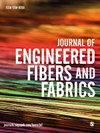涡流包芯纱针织物的舒适性研究
IF 2.3
4区 工程技术
Q1 MATERIALS SCIENCE, TEXTILES
引用次数: 0
摘要
采用不同纤维组合的不同纺纱方法可优化消费者对耐用性、功能性、舒适性和价格的要求。涡流纱及其生产的织物由于较低的纱线生产成本和令人满意的织物舒适性而引起了人们的兴趣。在这项工作中,三种不同纱线支数(400、300和200)的包芯涡流针织物 dtex)与六种不同芯纱类型(70 分特聚乙烯醇,110/36分特/长丝聚酯纱,80/36 dtex/涤纶长丝,110/333 dtex/长丝微聚酯纱,50/96 dtex/长丝,120 dtex短纤涤纶涡流纱)和两种不同的鞘条类型(100%粘胶、涤粘混纺条)进行了研究。比较评价了这些针织物的水分管理传输性能(MMT)、水蒸气渗透性能和透气性能。使用三元方差分析检验对获得的结果进行统计学评估。结果表明,芯纱类型、鞘条类型和纱线线密度是影响包芯涡流织物MMT、透水性和透气性的主要因素,其显著性水平为0.05。对纱线毛羽与水蒸气渗透性、纱线毛羽和透气性的相关性进行了分析。所进行的工作为更好地理解某些包芯涡流纱参数对针织物舒适性能的影响提供了初步阶段。本文章由计算机程序翻译,如有差异,请以英文原文为准。
Investigation of comfort properties of knitted fabrics made of core-spun vortex yarns
Different yarn spinning methods with different fiber combinations provide an optimization for the consumer requests of durability, functionality, comfort, and price. Vortex yarns and the fabrics produced from these yarns have aroused interest for the last years owing to lower yarn production cost and the satisfying fabric comfort properties. Within this work, core-spun vortex knitted fabrics of three different yarn count (400, 300, and 200 dtex) with six different core yarn type (70 dtex Polyvinyl alcohol, 110/36 dtex/filament polyester yarn, 80/36 dtex/filament polyester yarn, 110/333 dtex/filament micro polyester yarn, 50/96 dtex/filament, 120 dtex staple polyester vortex yarn) and two different sheath sliver types (100% viscose, polyester-viscose blended sliver) were studied. Moisture management transport property (MMT), water vapor permeability, and air permeability properties of those knitted fabrics were evaluated comparatively. Obtained results were statistically evaluated using three-way ANOVA test. It was determined that core yarn type, sheath sliver type, and yarn linear density were generally influential factors on MMT, water vapor permeability, air permeability properties of the core-spun vortex fabrics at significance level of 0.05. Correlation analyses between yarn hairiness and water vapor permeability as well as between yarn hairiness and air permeability were indicated. The conducted work provides an initial phase toward a better understanding of influence of some core-spun vortex yarn parameters on comfort properties of knitted fabrics.
求助全文
通过发布文献求助,成功后即可免费获取论文全文。
去求助
来源期刊

Journal of Engineered Fibers and Fabrics
工程技术-材料科学:纺织
CiteScore
5.00
自引率
6.90%
发文量
41
审稿时长
4 months
期刊介绍:
Journal of Engineered Fibers and Fabrics is a peer-reviewed, open access journal which aims to facilitate the rapid and wide dissemination of research in the engineering of textiles, clothing and fiber based structures.
 求助内容:
求助内容: 应助结果提醒方式:
应助结果提醒方式:


